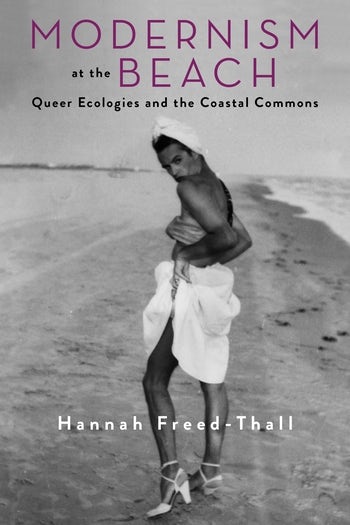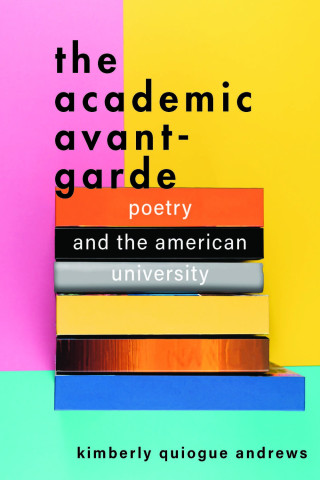2024 MSA Book Shortlist (for books published in 2023)

WINNER: Hannah Freed-Thall, Modernism at the Beach: Queer Ecologies and the
Coastal Commons (Columbia University Press, 2023)
We wouldn’t dare call it a beach read, but Hannah Freed-Thall’s gorgeously written, meticulously researched Modernism at the Beach is certainly a scholarly page-turner. In fresh readings of Marcel Proust, Virginia Woolf, Rachel Carson, Claude McKay, Samuel Beckett, and contemporary performance art, Freed-Thall traces the shifting possibilities of the beach across the twentieth century. The beach, the coast, the seashore – in Freed-Thall’s hands, it becomes more than a backdrop for wealthy leisure, and we learn to see it as at once a site of queer utopian possibility and a harbinger of impending ecological devastation. As she reminds us, beaches “are commons in the same way that artworks are—it’s a largely unrealized promise, but one worth taking seriously all the same.” Take this book seriously: it is essential reading for scholars and students of modernist studies, queer studies, and ecocriticism alike.

Kimberly Quiogue Andrews, The Academic Avant-Garde: Poetry and the
American University (Johns Hopkins University Press, 2023)
This extraordinary book demands that we recalibrate our understandings of the relationship between creative writing, literary studies, and the modern university. A poet-critic herself, Andrews attends to the impact of institutional forces on literary innovation, arguing that literary criticism is not only a response to poetry but a necessary part of its development. Grounded in an exploration of Wallace Stevens’ reflexive poetics, this study is organized around different categories of academic labor: reading (John Ashbery and Mei-mei Berseenbrugge), teaching (Jorie Graham), theorizing (John Keene and Claudia Rankine), and historicizing (Susan Howe), insisting throughout on the university as a primary—if not the primary—site of production of contemporary poetry and poetics. The result is a serious and timely defense of literary study, its historical power and future possibilities, and it should be required reading for us all.

Susannah Young-ah Gottlieb, Auden and the Muse of History (Stanford
University Press, 2023)
This profound and nuanced study brings to light Auden’s troubled, perplexed, but ultimately generative struggle to tease out the increasingly estranged relationship between poetry and history after the horrific events of the twentieth century, highlighting his effort to distinguish poetic language from the lies told in the name of civilization. The book is informed throughout by Auden’s practice of revision and by significant archival evidence in his drafts and manuscripts. Roving with ease across philosophy, critical theory, and psychoanalysis, and with attention to touchstone figures such as Freud, Yeats, Baudelaire, and Eliot, Gottlieb demonstrates a deep understanding of Auden’s intellectual pursuits and the questions that drove subtle but significant shifts in Auden’s thinking even as she pays detailed attention to the formal elements of his craft. Finely attuned to the subtleties and shifts in Auden’s thought, as expressed in both poetry and prose in the later portion of his career, Gottlieb also highlights Auden’s silences, what he could but doesn’t say, or is reluctant to state too plainly or too propagandistically. In illustrating Auden’s persistent commitment to write poetry he felt to be responsible to or “true” to history, even when that relationship is at its most strained, this study provides readings that are no less responsible to Auden’s poetry, and no less committed to unraveling, and learning from, the intricacies of historical thought in Auden’s writing.
David Herd, Writing Against Expulsion in the Post-War World: Making Space
for the Human (Oxford University Press, 2023)
Writing against Expulsion in the Post-War World is a timely and politically urgent study that connects postwar experiences of forced displacement and mass migration with our contemporary moment. He traces an important history of the “geopolitical non-person”—a dehumanized individual whose essential rights have been suspended. Reading poetic and philosophical works by Charles Olson, Hannah Arendt, and Frantz Fanon alongside first-hand accounts, government policies, and the Universal Declaration of Human Rights, Herd makes a powerful case for the relevance of literary analysis to real-life legal and political dilemmas. Blurring the boundaries between literary scholarship and activism, Herd delivers nothing less than a manifesto against the current political climate where detention, expulsion, and deportation have come to define the very conditions of civic life.

Rielle Navitski, Transatlantic Cinephilia: Film Culture between Latin
America and France, 1945–1965 (University of California Press, 2023)
Transatlantic Cinephilia is a wide-ranging study of how, in the two decades following the end of World War II, a growing number of institutions across Latin America sought to foster an audience for arthouse cinema in the face of mass culture and Cold War politics. In an impressive feat of archival recovery, Navitski explores a diverse array of film clubs, cinémathèques, film festivals, and film schools—many modelled on European, especially French, predecessors—that actively shaped the preferences and habits of cinemagoers, transforming them from passive consumers into devoted cinephiles. Interweaving a wealth of historical details and insights, Navitski tells a larger story with deep significance for modernist studies. She shows us how the cultivation of aesthetic taste is intertwined with institutional tensions and conflicts, and how we might address European influence without falling into Eurocentrism. Transatlantic Cinephilia is an essential book for modernist scholars, film historians, and cinephiles worldwide.
Nominating Committee: Melanie Micir, Washington University (Chair), Robert Stilling, Florida State University, Philip Tsang, Colorado State University
About
Each year, the Modernist Studies Association seeks nominations for
its Book Prize, awarded to a book published in the
previous year. A panel of judges determines the book that made the
most significant contribution to modernist studies. A book initially
published in another year will not be eligible for the prize. This
exclusion applies even if a new edition (paperback or revised, for
example) was published in the award year.
Please visit our Nominations page in Spring 2025 to recommend a book( published in 2024). Visit our Archive to see previous winners.